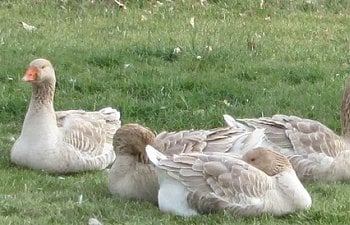Geese are primarily grazing animals. They have similar nutritional needs and eating habits to horses and other similar livestock. An ideal diet for geese would be 80%+ fresh grass, supplemented with grains. Geese eat around the clock as their bodies digest food very quickly. If no fresh grass is available, you can offer them green colored, sweet smelling, high quality grass hay or fresh vegetables. When offering a new food, whether it is a type of grass, grain, or even a tasty treat, geese tend to be slow and regard it with suspicion. It may take them a few days before they realize that the new food is yummy.
Grass: Geese like timothy, brome, meadow grasses, rye, oat grass, etc. They also like certain weeds, such as dandelions (which are excellent for them) and stinging nettle, but will not touch most types of weeds that grow on our property. They also do not like legumes, i.e. alfalfa or clover (at least my geese won't eat it in the pasture).
Grain: Choosing a type of grain can be challenging. Many people swear by wheat and oats and frown upon corn. Some use chicken scratch ($10 per 50lb bag) while others use Mazuri waterfowl ($40 per 50lb bag). Our dewlap toulouse geese, who live in smaller grass yards around our house, get approximately 2 cups of grain each twice daily, consisting of ½ Mazuri waterfowl maintenance and ½ Purina flockraiser. In the winter (which is bitter in the northern Utah mountains), they get whole corn in addition to the Mazuri and Purina. Our African geese, who live on 9 acres of pasture with year-round stream and access to a wider variety of food to forage, get approximately 1 cup twice daily of ½ Purina flockraiser and ½ whole corn. In the winter, their corn ration will double. We like to feed them enough grain that it takes a couple of hours for their bowls to be emptied after each feed. Amounts will vary depending on time of year, temperatures, and availability of fresh grass. If there is food left over at the next feeding time, we have fed too much. If they do not leave their bowls until emptied, then we know have not fed enough.
Treats: Geese love treats! Our geese's favorite treats are fresh corn (hulls removed), watermelon, and romaine lettuce. Lots of geese also enjoy cantelope, green peppers, carrots, apples, peas, kale, bok choy, tomatoes, etc. Stay away from giving bread, since it is not good for them. Spinach is also surprisingly bad for them. There is an acid in spinach that blocks calcium absorption, which is important for good bone density, so avoid spinach! Of course, a good rule of thumb is that if a food item is toxic to dogs, cats or horses (like raw onion), it most likely is toxic to your geese.
Final note: When raising geese from baby goslings, diet is extremely important! Geese need sunshine, grass, and proper exercise to develop properly. Keeping geese inside or in small dirt pens and feeding grain only is asking for trouble. Angelwing is a horrible cosmetic deformity and a common problem from feeding a grain diet with restricted exercise. Dewlap toulouse geese are especially prone to leg issues, so balancing their weight gain with outdoor exercise and nutrients (like niacin) that are best found in fresh grass is critical to avoid serious leg problems.



